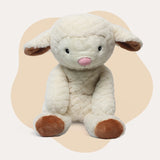Living with a sensitive nervous system
Some people perceive the world just a little more intensely. Smells, sounds, emotions, and atmospheres resonate more intensely. They are highly sensitive, also known as HSPs (highly sensitive people). Approximately 1 in 5 people are highly sensitive. But what exactly is highly sensitive? And how can you manage it effectively?

What is highly sensitive?
Being highly sensitive means your nervous system reacts more sensitively to stimuli. You notice small details more quickly, sense the moods of others, and can experience emotions more deeply. This can be wonderful, but sometimes also overwhelming. Viewing high sensitivity as a strength is important, but it also sometimes requires extra self-care.
When are you highly sensitive?
Not everyone who feels sensitive is necessarily highly sensitive. There are several characteristics of high sensitivity that can help you recognize it:
-
Deep thinking and analysis
-
Sensitive to sound, light or smells
-
Easily affected by emotions, both positive and negative
-
Great empathy
-
Need for rest and time for yourself
-
Strong intuition
If you recognize many of these characteristics, there is a good chance that you are highly sensitive.
High sensitivity in children
Children can also be highly sensitive. A highly sensitive child can become overstimulated more quickly in busy situations, react strongly to changes, or have a strong need for security and structure. It's important to acknowledge this sensitivity and provide them with a safe environment where they can relax.
Dealing with stress in a highly sensitive way
For HSPs, stress can feel particularly difficult. Because stimuli are received more intensely, the nervous system becomes overloaded more quickly. Therefore, it's essential to take good care of yourself:
-
Include sufficient rest periods
-
Dosing stimuli
-
Sufficient sleep
-
Looking for moments of relaxation
-
Being surrounded by people who understand you
A sense of safety and security are essential here. This calms the nervous system and creates space to recharge.
How can a weighted hug help?
A weighted stuffed animal can contribute to the feeling of security that many highly sensitive people seek. The soft weight creates a gentle pressure, similar to a loving embrace. This activates the parasympathetic nervous system and helps reduce tension. Many HSPs experience greater relaxation, security, and peace as a result, both during the day and while sleeping.
A Support Group acts as a constant companion. Always there when the world feels overwhelming. For both adults and children, a weighted cuddly toy can be a valuable support in coping with hypersensitivity.

High sensitivity as a strength
While being highly sensitive can sometimes present challenges, it's also a wonderful quality. Many HSPs are empathetic, creative, intuitive, and detail-oriented. By taking good care of yourself and maintaining your boundaries, high sensitivity can become a remarkable strength.




